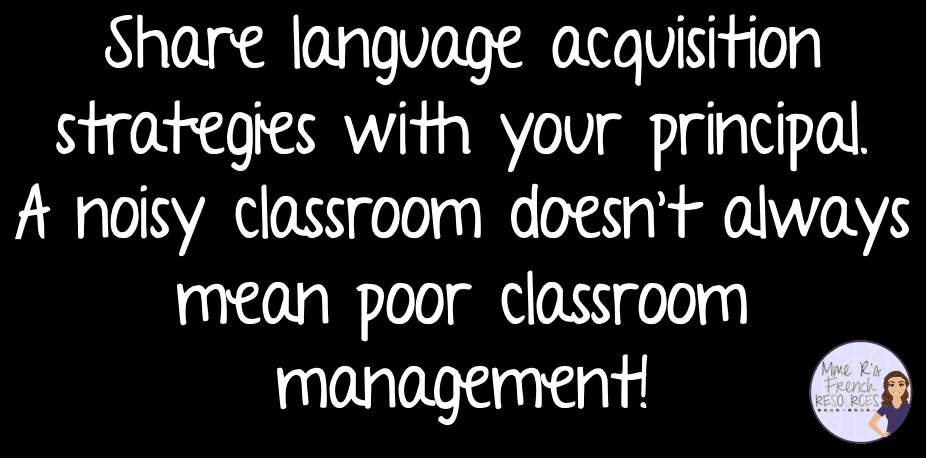
Foreign language teachers : Do you have a principal that just doesn’t understand you? Are you frustrated with unfair scheduling, teacher evaluations that favor certain subjects, or teaching requirements that are impossible to meet? Read on!
I have a lot of teacher friends, and when we talk about difficulties we have had as teachers, a lot of things come up. Never-ending paperwork, challenging students, pressure to score well on standardized tests, lack of resources… the list goes on and on. However, the when I talk to my French teacher friends, the same issue gets mentioned over and over : What to do when your principal doesn’t understand foreign language learning. I’ve left jobs for exactly this reason only to find that it is the same at the next school.
I know that all teachers feel misunderstood at times. We wonder how our administrator has so easily forgotten what it is like to be a teacher. Staff meetings are painful, because we have so many things to be doing and yet we spend hours in meetings and professional development. Yes, we have all felt misunderstood at some point.
I’m writing today, because I think the lack of understanding is especially true when we teach something that is so… well, foreign to our principal. Foreign language teachers across the world report the same issues with their administration. They just don’t understand what I do in my classroom!
What doesn’t the principal understand?
The principal doesn’t understand foreign language teaching methods, so we get reprimanded for having a noisy classroom. We get funding last. French classes are crammed to the max, because there isn’t money for another teacher. We might have to change classrooms multiple times a day. We might even teach at two schools. Students enroll in our classes when they don’t have another elective to go to (and some of them REALLY don’t want to be there). They cut your French class to make room for more Spanish classes. And by the way…they need to you teach Spanish. Oh, you don’t speak Spanish? Well, surely it isn’t too hard to just learn a little bit, is it?

There are schools that group all languages together, because the principal doesn’t understand how languages 1 and 2 would be taught differently. This leaves a foreign language teacher in a department with the majority language, which, in my case, would be English. So, I try to imagine a school where my department head is an English 12 teacher who is teaching novels, research papers, or narrative writing in the students’ first language. Then, I imagine a meeting where that department head decides what the FSL teacher needs to do in his/her classroom. How would he or she even know?
Teaching is not an easy job no matter what subject you teach. In addition, there are some definite challenges to being a foreign language teacher. Your needs are not the same as other teachers, and your workload can be a great deal heavier.
Here are some things you can do if your principal just doesn’t understand.
1. Start off on the right note by seeking your administrator’s perspective.
Recognize the work your principal did to get to this leadership role. Chances are, he or she understands things that you might not. Does that mean that he or she will always make decisions that you agree with? No. It doesn’t mean you have to like them, either. It does, however, mean that you should listen respectfully to his or her reasons for implementing certain changes. You will also have an idea of what you’ll need to show the administration in order to make the changes you want.
It’s also important to realize that many changes may not be coming from that principal but his/her higher-ups. Even if your administrator agrees with you that there should be another section of French 2 offered instead of having a class with 37 students, that doesn’t mean that the school board or the superintendent will agree. It doesn’t mean that there is enough money in the budget for it. What it does mean is that you have a sympathetic ear. If you work to understand the principal’s reasons, you might find yourself less irritated and unhappy at your job. It also might bring to light just how hard you are working so that your principal cuts you some slack when it becomes obvious you have a lot on your plate.
Although you might not get the changes you wish for, it will help you and your principal work together. Sometimes, if you wait a while, the changes you wish for will come your way. I waited for several years for the district to hire a second French teacher, and eventually, my patience paid off.
2. Invite your principal into your class when you’re doing something great so that he or she really understands what it is you do.
It just seems like they come in at the wrong time for a walk-through. Do they come in on the day when you are doing a really cool, interactive activity that has all of your students speaking French? Maybe, if you do that enough. It’s more likely that they come in when your students are reviewing for a test, doing bellwork, or revising a paragraph. That’s fine, since that is a normal part of a schoolday, but it looks like every other class. If you want your principal to see how your class is unique, you might need to help him or her see it. Find a day when your students are doing skits, working at cool stations you have created, presenting projects, or just having conversation time, and invite your principal in.
He or she might not understand everything that is happening, and that is even better, because it will showcase how special you are as a teacher and how much goes into everything you do. If your principal doesn’t understand your teaching practices, share some good foreign language teaching methods with him or her. The noisy classroom will not look like a classroom management disaster to the principal if he or she understands the language acquisition needs of students.
Want some ideas for using more French in your class? Read this!

3. Document everything.
Yes, it is a pain. It takes a long time, and it is more paperwork for you. However, in the end, if you want to show that certain teaching practices are not effective for your course, you need to have something to back that up. Principals love data! If your principal doesn’t understand where you are coming from, provide him or her with concrete examples.
When the school mandates are unrealistic:
Perhaps you are expected to complete a certain number of assessments per grading period, but that doesn’t fit with what you actually need to teach. You’ll be creating assessments just because they said to, and that is not an effective practice. In that case, be prepared to take your learning projections to the principal. Show him or her exactly what you plan to teach and why the school-wide goal isn’t reasonable for your area. Come with ideas on how you can meet in the middle. Maybe you could do half the required assessments and then use other activities that align better with your specific needs.
When the school mandates decrease your instructional time of your subject:
Let’s say your school has a mandate that you must teach certain test strategies or academic vocabulary, although neither matches AT ALL with your course objectives. You could spend 10 minutes of each day doing something completely unrelated, then stop that, warm your students up, and teach your lesson. You’ll lose valuable minutes each day, meaning you’ll get through so much less of what you need to teach. In that case, you could take in the minutes spent per month or semester so your principal sees the big picture. This once happened to me, and I lost nearly 2 months instructional time of French that year. The next year, I met with the principal to come up with a way I could support the school-wide mandate in a way that fit in with my needs. It took some work, but we came up with a way to make it work.
When you are not a priority in scheduling:
Maybe your only French 2 class is scheduled at the same time as another class that the school offers once a day. As a result, you lose kids each year, because they have to take that other class. You could give students an anonymous survey before enrollment, asking whether they plan to take your class the next year. When I’ve done this, I also asked those who planned to continue with French if there would be something that would stop them from enrolling for the next year. As one of my classes was put against band, also only offered that hour, several of them chose band. Once I knew this, I presented it to administration and the scheduling department to see if we could find another hour to put this class. It also never hurts to make friends with the counselors and administrative assistants who work on the schedules. 🙂
When your principal dictates your teaching strategies:
Have you ever been told that you couldn’t teach grammar? Did you even try to make that work or did you hide your grammar lessons inside of other activities so that your students would still learn? Or maybe your principal told you that you had to teach completely in French, even in your first year class. Perhaps you are forced to teach with a book that doesn’t even align to your curriculum!
These crazy things happen, and they happen often when the principal doesn’t understand language learning. I’ve seen what happens when grammar isn’t taught, and it isn’t pretty. I’ve witnessed students drop classes quickly when they don’t understand anything that is happening. The point is, while there is truth in saying students need more immersion, or that grammar sheets aren’t THE way to mastery, that doesn’t make it an all-or-nothing situation. The teachers are trained to know what their students need, and well-meaning administrators often tell them to do the opposite.
Again, show your principal what you do and be prepared to explain why it is important. If you want to teach grammar and it is discouraged or forbidden at your school, do a pre and post assessment on a grammar point with explicit teaching. Then, do the same thing on another grammar point that you do not explicitly teach. You’ll have more of a chance of helping your principal see your side if you have evidence to back it up.
4. Ask for a stipend or a sub so you can have a work day.
Do you have to do the same paperwork per course as your colleagues? If so, do you have the same number of courses to prepare? Often, French teachers have numerous preps and must complete the same paperwork, lesson planning, curriculum writing, or data sheets as the teachers who have 1 or 2 preps. Not only is this unfair, it is just unreasonable.
If principals want their teachers to be effective and engaging, then they need to have adequate time to prepare and grade. If your job requires you to carry a much heavier load, try and ask your principal if you can get a sub for a work day so that you can prepare the documents. Your principal might say no, but you could be surprised. I’ve done this a few times and it has greatly reduced the stress. As a result, I created better lessons with my time. Now, I will also say that sometimes I was denied. At those times, I ended up taking a sick day to catch up. Not fair to me, but still preferable to running myself into the ground.
5. Apply for a department head or team leader position or volunteer for a teacher committee.
I know that it sounds crazy to take on more responsibility when you are already drowning in paperwork. However, if you want to have a voice, sometimes you have to be willing to do a bit more. If you are a department head, team leader, or are part of a committee with your principal, you’ll get more time to speak with him or her. If you want your principal to understand your point of view, work alongside him or her more often. Your principal will consider your ideas more. You will be part of the discussion. You’ll see things from your principal’s side as well. I’ve found that the best way to negotiate with someone is to see that person’s side. You’ll also sometimes be privy to information before big changes happen. That means you can give your input and you might influence the newest policy.
The pros and cons of when your principal doesn’t understand
As I’ve often said to one of my teacher BFFs, teaching French is a blessing and a curse. The principal may never understand what you do. You will be overlooked in many ways, but you will also have some freedom that other teachers might not have. Some students won’t want to be in your class, but you will get a lot who choose the class because they love it (or you). You will spend a lot of time writing curriculum, but chances are, you get more say in the curriculum than your district’s math or English teachers do. The teacher next door might have 1 prep while you have 5, but you also get to teach the same kids for 5 years in a row.
I found that how I looked at it determined how I was going to feel about it. Is it one of the harder teaching jobs? I think so. I also think it’s one of the most rewarding. Just recently, I had a student write to me from Paris to thank me for teaching her so well. Not long after that, I reconnected with another student who is teaching English in France now. He started taking French with me, and now he lives in France. I truly believe that French teachers open so many doors for their students. When you get frustrated, just remember the difference you are making in the lives of your students. ❤️



Leave a Reply